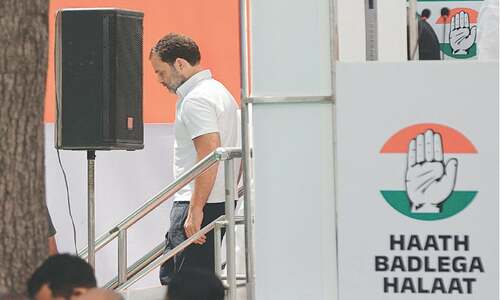NEW DELHI: In its platform, which was made public on Friday, the largest opposition party in India, Congress, pledged to use “affirmative action,” or reservations in jobs and admissions, to safeguard disadvantaged castes and religious minorities, a statement typically taken to indicate Muslims, should they win election victory.
After more than 50 years of center-left leadership, the Congress has found it difficult to compete with Modi’s Bharatiya Janata Party (BJP), which primarily draws support from the nation’s Hindu majority.
Beginning on April 19, the seven-phase election will conclude on June 4 with vote tallying.
In its electoral manifesto, the Congress promised increased support for the impoverished, regardless of caste, and more assistance for the so-called backward castes. Other promises included larger health insurance payouts, guaranteed prices for farm output, and jobs for the young.
In his platform, party president Mallikarjun Kharge—who hails from one of India’s most disadvantaged castes—stated that over the past 70 years, Congress has been the most outspoken and engaged supporter of the advancement of the oppressed and backward classes and castes.
“Caste discrimination still exists, though.”
At a press conference, Kharge enumerated some of the major promises, to which party members only offered a mediocre response, prompting him to remark, “No claps, nothing!”
Numerous observers claim that the BJP’s hegemony in national politics is the reason behind the low morale within the Congress. According to a poll issued on Wednesday, the BJP alone is expected to win 342 seats in the lower house of parliament, while Modi’s National Democratic Alliance coalition is forecast to win 399 of the 543 seats.
It stated that there might be a record-low of 38 seats in Congress.
Tough election
Rahul Gandhi, the former leader of the Congress, stated that the election is “much closer than being propagated.”
At the event, he declared, “It’s a close election and we are going to fight an excellent election and we are going to win the election.”
Congress promised to “strengthen the agenda for affirmative action” by conducting a socioeconomic and caste census and securing a constitutional amendment that would increase the 50% cap on reservations for backward castes in government jobs and education. This would happen should Congress be voted back into power.
Despite making up about 70% of India’s 1.42 billion population, the party claimed that “their representation in high-ranking professions, services and businesses is disproportionately low.”
Hinduism has used the caste system for thousands of years to establish hierarchies; nevertheless, affirmative action programs have challenged the system in recent decades, albeit to varying degrees of success.
According to a government poll issued last month, the average monthly spending of marginalized castes from scheduled tribes, scheduled castes, and other backward classes in rural and urban India in 2022–2023 lagged below privileged castes by 27% and 30%, respectively.








